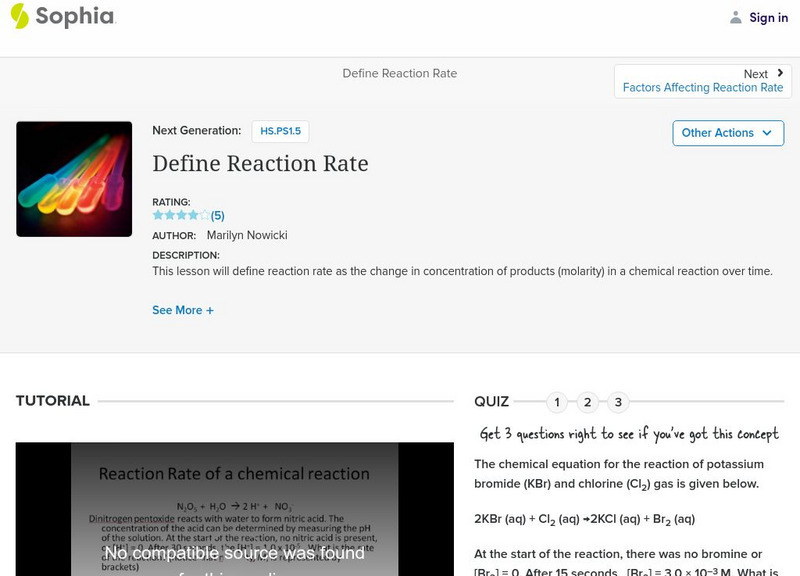Hi, what do you want to do?
Bozeman Science
Solutions
In this video Paul Andersen explains the important properties of solutions. A solution can be either a solid, liquid or gas but it must be homogeneous in nature. The solutes can not be separated with a filter and so either chromatography...
Curated Video
How to Calculate Molarity | Chemistry Made Easy
Calculating molarity is as easy as plugging numbers into the triangle and using your calculator to either multiply or divide the numbers given in the problem. Calculating molarity is important in chemistry as molarity is a common...
Curated Video
Moles
This video will explain the concept of a mole and how to convert between moles, grams, and atoms.
Curated Video
Molarity
This video will explain the concept of a mole and how to calculate the molarity of a solution using concentration of solutions.
FuseSchool
Neutralisation of Alkalis
Learn the basics about solubility rules for insoluble salts, as part of the overall acids, bases and alkali topic.
Professor Dave Explains
IIT/JEE Chemistry Practice #9: Molarity/Molality
Practice REAL problems from actual past IIT/JEE exams with Professor Dave!
Professor Dave Explains
IIT/JEE Chemistry Practice #11: Moles/Molarity
Practice REAL problems from actual past IIT/JEE exams with Professor Dave!
Professor Dave Explains
Practice Problem: Dilution Calculations
Dilution calculations are easy! We just need to know about the concept of concentration, and then the equation M1V1 = M2V2. Try some examples!
Professor Dave Explains
Practice Problem: Molarity Calculations
Solution concentration is measured in molarity, which is moles solute per liter of solution. Can we calculate concentration, moles, or volume, given the other two values? Sure, it's easy!
Professor Dave Explains
Acid-Base Titration
Any introductory chemistry class will include titrations, and to do these, you have to do math. But you get to see pretty colors, too! Here's a quick run through of the stoichiometry of it all.
Professor Dave Explains
Calculating Ion Concentrations in Solution
We know that concentration is typically expressed with molarity, which is moles per liter. But how do we know how many moles of solute are present in solution when an ionic solid dissolves in water? It's not so simple because these will...
Professor Dave Explains
Expressing Concentration by Mass Percent
We know how to express solution concentration in terms of molarity and molality, but the common public also needs to communicate concentration for certain reasons, and they don't really know about moles and things like that. What do they...
Professor Dave Explains
Kinetics: Initial Rates and Integrated Rate Laws
Who likes math! Oh, you don't? Maybe skip this one. Unless you have to answer this stuff for class. Then yeah, watch this.
Professor Dave Explains
Molarity and Dilution
Now those pesky moles are swimming! But how much solute is there? Let's learn about how we measure concentrations of solutions.
Professor Dave Explains
Molality and Colligative Properties
Solute particles interfere with the physical processes a solution may undergo. These are known as the colligative processes of a solution. Ever wonder why we put salt on icy streets? Find out here!
FuseSchool
Calculating Molarity
Learn the basics about calculating molarity as part of the chemical calculations topic.
Crash Course
Solutions
Why are chemists great for solving problems? They have all the solutions. Introduce your young chemists to the various ways of describing solutions, including molarity, molality, and mass percent, with a video that also explains why...
Crash Course
Equilibrium Equations
Why do scholars need to know the quadratic formula? Check out this video that explains one application for the formula and how it makes solving equilibrium equations much easier. The video also covers chemical reactions and RICE...
Teacher's Pet
Molarity
Is your chemistry class finding it hard to concentrate these days? Give a short molarity video a try! Pupils learn the basics of the molarity calculation as they work along with the narrator.
Crash Course
Water and Solutions - for Dirty Laundry
The Earth is over 70% water and so are our bodies. What makes water so special? Learn about water and its properties as it relates to solutions, dilutions, electrolytes, and molarity.
Khan Academy
Khan Academy: Suspensions, Colloids, and Solutions
Understand suspensions, colloids, and solutions, and learn the difference between molarity and molality. [13:57]
Khan Academy
Khan Academy: Chemistry: Suspensions, Colloids, and Solutions
A video lecture discussing the properties of homogeneous mixtures and how to distinguish between the different types. Understand that homogeneous mixtures that have large particles that eventually settle to the bottom are known as a...
Sophia Learning
Sophia: Define Reaction Rate
This lesson will define reaction rate as the change in concentration of products (molarity) in a chemical reaction over time.
Crash Course
Crash Course Chemistry #27: Solutions
Tutorial illustrating the ideas of solutions and discussing molarity, molality, and mass percent. Also, why polar solvents dissolve polar solutes, and nonpolar solvents dissolve nonpolar solutes. [8:21]













